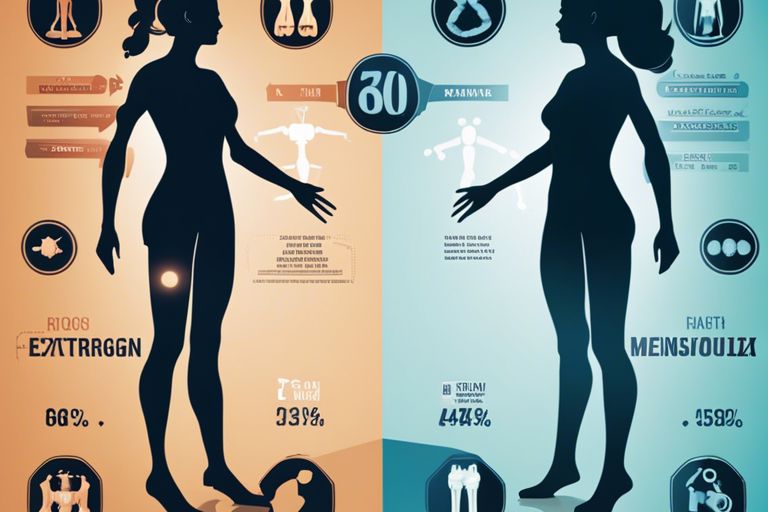Menopause is a natural stage in every woman’s life, marking the end of her reproductive years. Alongside the signature symptoms such as hot flushes and mood swings, many women also experience sleep disturbances during this time. Insomnia, the inability to fall or stay asleep, is a common complaint among menopausal women. The hormonal changes that come with menopause can disrupt the body’s natural sleep patterns, leaving many women feeling fatigued and irritable. In this blog post, we will explore the connection between menopause and insomnia, discussing the causes and potential solutions to help women navigate this challenging aspect of the menopausal transition with confidence and knowledge.
Key Takeaways:
- Menopause can lead to insomnia: Hormonal changes during menopause can cause sleep disturbances, including difficulty falling asleep and staying asleep.
- Hot flushes and night sweats: These common menopausal symptoms can also disrupt sleep patterns, leading to insomnia.
- Impact on quality of life: Insomnia during menopause can have a significant impact on a woman’s quality of life, affecting mood, concentration, and overall well-being.
- Healthy lifestyle changes: Implementing lifestyle changes such as regular exercise, maintaining a healthy diet, and practising relaxation techniques can help manage insomnia during menopause.
- Consultation with healthcare provider: If insomnia persists and significantly impacts daily functioning, it is important to seek advice from a healthcare provider who may recommend treatment options or therapies to improve sleep quality.
Hormonal Changes and Sleep Patterns
Estrogen and Progesterone Impact on Sleep
During menopause, the levels of estrogen and progesterone in a woman’s body decrease significantly. These hormones play a crucial role in regulating sleep patterns. Low levels of estrogen can lead to hot flashes and night sweats, which can disrupt your sleep and make it difficult to stay asleep throughout the night. Similarly, progesterone has a calming effect on the brain, helping you feel relaxed and promoting better sleep quality.
The Role of Melatonin in Menopause-Related Insomnia
Melatonin is a hormone produced by the pineal gland in response to darkness, helping to regulate our sleep-wake cycle. During menopause, fluctuations in hormone levels, especially estrogen, can disrupt the production of melatonin and lead to sleep disturbances. This can result in difficulty falling asleep, frequent awakenings during the night, and overall poor sleep quality.
It’s important to understand the impact of hormonal changes on your sleep patterns during menopause. Maintaining a healthy lifestyle, managing stress levels, and establishing a regular sleep routine can all help alleviate menopause-related insomnia and improve your overall sleep quality.
Symptoms and Diagnosis
Identifying Insomnia During Menopause
During menopause, many women experience difficulty falling asleep, staying asleep, or waking up too early. These sleep disturbances can lead to daytime fatigue, irritability, and difficulty concentrating. To diagnose insomnia during menopause, doctors may ask about sleep patterns, conduct physical exams, and may recommend sleep studies to monitor sleep quality.
Other Sleep Disorders Affecting Menopausal Women
Aside from insomnia, menopausal women may also be at risk of other sleep disorders such as sleep apnoea, restless legs syndrome, or periodic limb movement disorder. These conditions can exacerbate menopausal symptoms and impact overall quality of life. Seeking medical advice and undergoing appropriate tests can help in identifying and managing these sleep disorders effectively.
Management and Treatment Options
Lifestyle Modifications and Natural Remedies
Managing menopausal insomnia can be approached through various lifestyle modifications and natural remedies. It is imperative to establish a relaxing bedtime routine, avoid stimulants like caffeine and alcohol close to bedtime, and create a comfortable sleep environment. Incorporating relaxation techniques such as meditation, yoga, or deep breathing exercises can also help improve sleep quality. Additionally, natural remedies like herbal teas, such as chamomile or valerian root, may provide some relief for menopausal insomnia symptoms.
Hormone Replacement Therapy and Medications
For some women, hormone replacement therapy (HRT) or medications may be recommended to manage menopausal symptoms, including insomnia. HRT involves the use of oestrogen and, sometimes, progestin to help balance hormone levels and alleviate symptoms. Medications such as low-dose antidepressants or sleep aids may also be prescribed to improve sleep quality during menopause. It is imperative to consult a healthcare professional to discuss the potential benefits and risks of these treatment options.
Prevention and Coping Strategies
Developing a Sleep-Conducive Environment
Creating a tranquil environment in your bedroom is crucial for managing insomnia during menopause. Keep your bedroom cool, dark, and quiet. Invest in comfortable bedding and ensure your mattress provides adequate support. Minimise electronic devices and remove any distractions that may disrupt your sleep.
Stress Reduction and Relaxation Techniques
Stress is a common trigger for insomnia in menopausal women. Incorporating relaxation techniques into your daily routine can help alleviate stress and promote better sleep. Consider practices such as deep breathing exercises, meditation, yoga, or listening to calming music before bedtime. These techniques can help soothe your mind and body, preparing you for a restful night’s sleep.
It’s imperative to find the right relaxation technique that works best for you. Experiment with different methods and establish a bedtime routine that includes relaxation practices to signal to your body that it’s time to wind down and prepare for sleep.
The Link Between Menopause and Insomnia
Menopause and insomnia are closely intertwined, with the hormonal changes during menopause often leading to sleep disturbances. The decrease in estrogen levels can disrupt the body’s internal clock, making it harder to fall asleep and stay asleep. However, understanding this connection allows women going through menopause to seek proper treatment and support to manage their insomnia. Lifestyle changes, hormone therapy, and relaxation techniques can all play a vital role in improving sleep quality during this transitional phase of a woman’s life. By addressing the link between menopause and insomnia, women can take proactive steps to prioritise their sleep health and overall well-being.
FAQ
Q: What is menopause?
A: Menopause is a natural biological process that marks the end of a woman’s menstrual cycles. It typically occurs in their late 40s to early 50s.
Q: How does menopause affect sleep patterns?
A: Menopause can disrupt sleep due to hormonal changes, hot flashes, night sweats, and mood swings, leading to insomnia and difficulty staying asleep.
Q: What are the common symptoms of insomnia during menopause?
A: Common symptoms of insomnia during menopause include difficulty falling asleep, waking up frequently during the night, waking up too early, and experiencing non-restorative sleep.
Q: How can menopausal insomnia be managed?
A: Menopausal insomnia can be managed through lifestyle changes such as maintaining a regular sleep schedule, creating a relaxing bedtime routine, avoiding caffeine and heavy meals before bed, and creating a comfortable sleep environment.
Q: When should I seek medical help for menopausal insomnia?
A: If menopausal insomnia significantly impacts your daily life, productivity, or mental health, it is advisable to seek medical help. A healthcare provider can offer further evaluation and recommend appropriate treatments such as hormone therapy or cognitive-behavioural therapy for insomnia.





